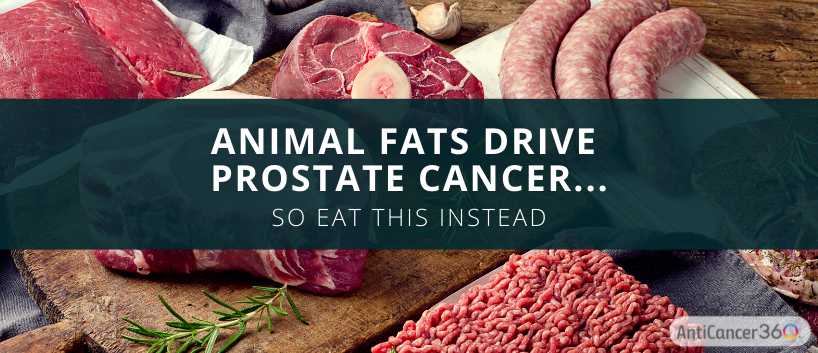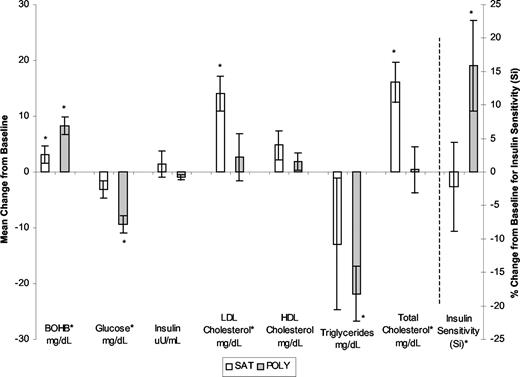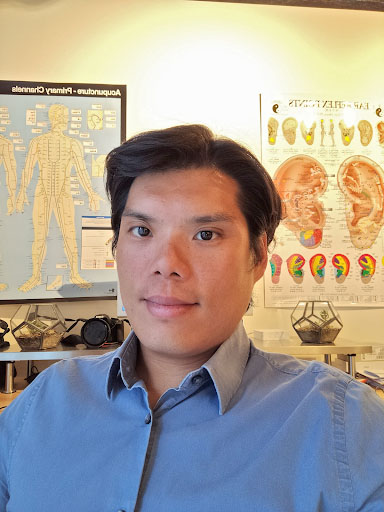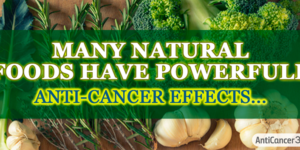Diet is clearly a factor when it comes to cancer. But HOW it affects cancer is not always so clear.
So, if you’ve looked into the world of anticancer diets, you’ve probably run into some heated debates.
And the biggest debate is between ketogenic diet advocates, and plant based diet advocates.
One side says sugar and carbs are bad. But they advocate a higher fat diet that includes meat and saturated fats.
The other side tells you to avoid meat and saturated fats. But they advocate a diet that is high in carbohydrates and sugar (albeit usually from whole food sources.)
But biology is much more complex than that… especially when it comes to cancer. And there’s no “one size fits all” when it comes to diet.
So we’re going to see an example of this today, with some new research out of McGill University.
Researchers Show That High Fat Diets Fuel Prostate Cancer
In a recent study conducted at the McGill University Health Center… researchers found a mechanism by which saturated fats promote prostate cancer [R].
So when you look at cancer genes overall… one of the genes that initiates and promotes cancer is called MYC.
And these researchers found that increased intake in saturated fat can actually mimic the effects of MYC overexpression. Most importantly, this effect increased the risk of death from prostate cancer in those who at the highest level of saturated fat, by about 4x!
And for those of you who are not obese, but still eat a lot of saturated fats (i.e. animal fats, and coconut oil…) you may still have a 3x increased risk of death from prostate cancer.
But here’s the interesting thing…
Most Plant Fats Didn’t Have This Pro-Cancer Effect
These researchers also checked to see if monounsaturated and polyunsaturated fats had the same effect on the MYC gene.
Monounsaturated fats are like what you’d find in olive oil and avocado oil.
Polyunsaturated fats are the omega 3’s and 6’s… basically what you’d find in things like fish, flax oil, hemp oil, sunflower oil… and most seed oils.
And what these researchers found was that these plant fats did NOT have the same effect on MYC like the saturated fats
A Plant Based Diet Is Preferable To Keto For Prostate Cancer
So when it comes to diet overall… we advocate 4 main types of anticancer diets depending on the case. And this includes both a plant based, and a ketogenic diet.
But when it comes to prostate cancer… we generally recommend AGAINST a ketogenic diet.
Instead we recommend either a plant based anticancer diet, or a whole foods anticancer diet.
And in both of these diets, we really prioritize “cold pressed, undamaged” polyunsaturated fats, as well as monounsaturated fats… not saturated fats.
Another important study that relates to prostate cancer and fats comes from Dean Ornish MD. And he also showed that a low fat plant based diet + exercise helped against prostate cancer [R].
You can learn more about this study from this video by Michael Greger MD of NutritionFacts.org (a plant based diet advocate.)
https://nutritionfacts.org/video/cancer-reversal-through-diet/
But… High Fat Low Carb Diets Can Help Other Types Of Cancer
Now, this doesn’t mean that a high fat diet is bad for every type of cancer. Because high fat ketogenic diets have shown to be beneficial for some cancers [R] [R]… especially ones that are “glucose avid” meaning that they burn sugar at a really fast rate.
So… the type of diet you should choose depends both on your type of cancer, as well as your personal preference and abilities.
But… this study also shows us another important fact. Because the TYPE of fats that you include in your diet can also change its effects.
So, one of the differences with our approach is that we generally prioritize the “cold pressed, undamaged” polyunsaturated fats… even for ketogenic diets.
And this is often not the case, since many ketogenic diet advocates rely a lot on animal fats and coconut oil for their diet (coconut oil is a plant based saturated fat.)
We prioritize the polyunsaturated fats on a ketogenic diet because it can lead to higher ketone levels, lower blood sugar levels, lower insulin levels, lower bad cholesterol levels, and increased insulin sensitivity [R]…. Basically everything you want in a ketogenic diet.
.
Now, it’s not so clear how a plant based saturated fat like coconut oil would affect MYC and prostate cancer in general.
We also don’t know how a ketogenic diet would affect MYC and prostate cancer IF it was mostly made up of polyunsaturated fats.
But it’s better to stick with what we do know… So if you are dealing with a prostate cancer, you should avoid saturated fats.
But how about polyunsaturated and monounsaturated fats on a PLANT BASED diet?
I Recommend At Least STARTING With A Higher Fat Plant Based Diet
So… though we’ve seen success with The Ornish Diet using a low fat plant-based approach for prostate cancer… I still believe it’s best to at least start your plant-based diet with a period of higher “healthy fat” intake.
Because as this study showed, polyunsaturated and monounsaturated fats didn’t have the same cancer promoting effects as the saturated fat.
So I advocate including plenty of healthy fats like fish oil, flax oil, hemp seed oil, chia seed oil, and pumpkin oil amongst others.
Because not only are these fats anti inflammatory in nature… they also make up the structure of your cell membranes. And this makes them crucial for optimal oxygen transfer and cell respiration [R].
So even with something like prostate cancer… I’d recommend at least starting with a higher intake of healthy fats… and even cycling into high fat periods from time to time.
This can help to “exchange” your cellular fats, so that your cells can function optimally.
So The “Best” AntiCancer Diet Depends On Your Type Of Cancer
So as you can see, there’s really no point in arguing over which anticancer diet is better.
The more important thing is to figure out which type of diet will have the highest probability of benefiting your case. This is why we use a variety of different anticancer diets that have shown potential for the most benefit.
But no matter which diet you are using… you should stay away from saturated fats if you fighting prostate cancer. This will maximize your chances of success.
Are You A Candidate For Our Program?
If you’d like to learn more about the AntiCancer360 approach and see if we can help you… please watch our free online webinar to learn more about our approach. Then at the end, you’ll be able to schedule a free call with someone from our team so that we can discuss your case in more detail.
Gene Wei is a Board Certified Doctor of Oriental Medicine in the state of Florida, and the founder of AntiCancer360. He’s also a graduate of the University of California Los Angeles, and East West College of Natural Medicine.
His practice is focused on integrative and natural anticancer strategies. Over the years, he’s helped many people overcome difficult cancers… including some cases of “terminal cancer” which were able to be reversed with an “Aggressive Integrative Approach.”









What are your thoughts about Vitamin B17,
Hi Richard! So here’s our position on B17. It could potentially help against the cancer, but it could also cause cyanide poisoning.
So there’s a lot of information about B17 on the internet that’s incorrect. They basically say that because of the differences in the enzyme systems of cancer cells, the B17 is only toxic to the cancer cells and not healthy cells. And that’s incorrect. It can be toxic to the cancer cells as well as healthy cells.
And there’s been many documented cyanide poisoning cases because of B17.
However, there’s also been research showing that it can help against cancer.
So basically if the cancer is chemo sensitive to B17 then it could help. If not, you’re just left with the risk of low to medium to high grade cyanide poisoning.
So, we’re not fully against it. But it’s just important to know the details so that you can watch for signs and symptoms of poisoning. And of course, it doesn’t happen to everyone because it depends on dosage and how fast the body clears the cyanide.